Dorothy Longenecker Hopper, 1920-2015
This was written by Dot Hopper’s friend Mary B. Seel in September 1985, a year before Joe and Dot retired from 38 years of ministry in Korea. Dot’s son David (my dad) revised and updated it in March 2020.
Dorothy Anne Longenecker was born to Minnie H. Hauhart, a Methodist from Missouri and J. Hershey Longenecker, a Mennonite from Pennsylvania. Dorothy’s parents were married in Missouri in September of 1915. Her father attended Louisville Seminary where he became a “Presbyterian by conviction” before graduation. (This was also the seminary where her father-in-law, Dr. Joseph Hopper attended.)
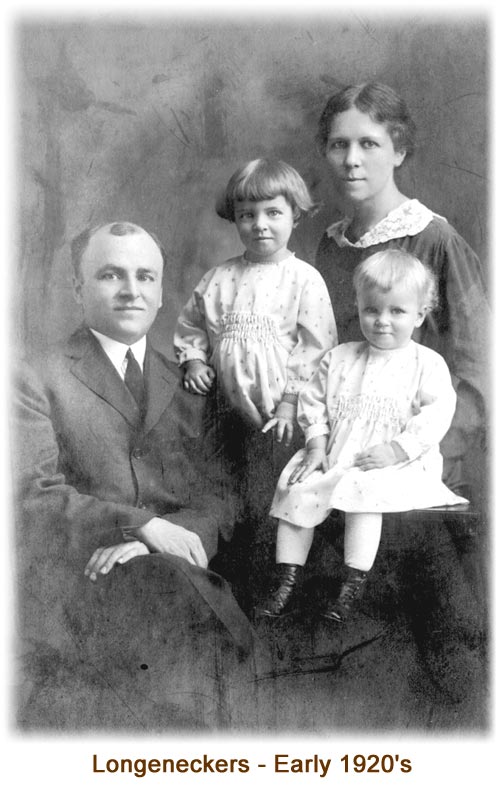
In 1917 Dorothy’s parents departed from New York to the Congo despite the fact that the ship before theirs had been sunk by a German submarine. It took four months of travel to arrive at Luebo, where in 1919 Dorothy’s sister, Alice was born during the flu epidemic. Lusambo, a freight depot on a river, had to be kept open; so, the Longeneckers volunteered to maintain this station. Dorothy was born on March 26, 1920. Her mother had just served tea to guests whom her daddy then escorted to a river boat at 2 PM, and she was born by 5:30.. A black missionary nurse, Mrs. Althea Edminston, a graduate of Fisk University, was present; later Mrs. Edminston worked for 16 years preparing a “high-perfect” grammar textbook of the Bakuba language. Mrs. Edminston’s husband was a minister and evangelistic missionary. Dot’s daddy, who had rather for a boy, wrote a poem about “Dorothy Anne, daddy’s little man.” Dorothy was baptized by one her parents’ beloved Congo pastors. It was customary for missionary parents at that time to leave their children in the States with relatives before returning to Africa, which was considered the “white man’s graveyard” when in 1922 the Longenecker parents were to return to their work, they could not to bear to leave Alice and Dot behind; so took their little girls back to Congo. This time they were assigned to live at Bibanga which is where Dot has her first memories.
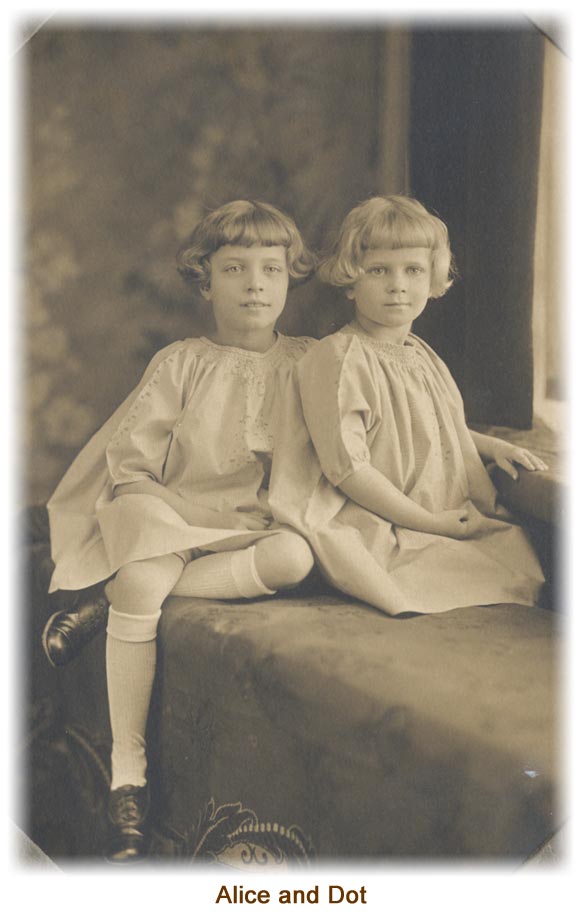
A younger sister was born but died at six-weeks-of-age when Dot was four. Because natives could not afford the cost of a wooden coffin, her parents decided that their baby, too, would be buried in the usual straw mat. At the time of the funeral, Dot remembers sitting pulling grass blades as they sang, “In the Sweet Bye and Bye, We Shall Meet on that Beautiful Shore.” Years later Dot learned from her aged daddy that her mother had often gone to the little grave and wept. She recalls her mother being quite ill at the time of her little sister’s birth. But there were happy memories of weaver birds and palm trees on the hill near where they lived in a mud and stick house with a grass roof, similar to the one in Lusambo where she was born. When weaver birds were necessarily shot to protect the palms, she and Alice carefully had funerals of them. For four years the little girls prayed for a baby brother. When Dot was 7 years old, their brother, Jim, was born. They were so pleased that he belonged to them that they were very selfish about him at first, until some of the care became a chore, so they decided to share some of the “duties” such as pushing his stroller.
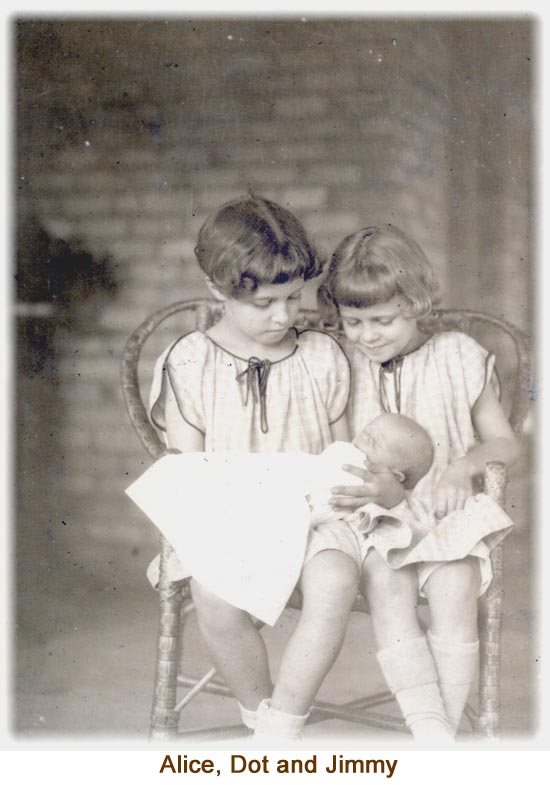
Her mother had been the youngest of ten children. Aunts sent the little missionary girls dolls that would cry. Mail was brought 30 miles by a man with a sack on his back. As the mailman was coming through the forest, he shifted the sack and the dolls began to cry. He dropped it and fled knowing that there were evil spirits after him! Others had to retrieve the mailbag with the crying dolls inside. The sisters had heard about operations from Dr. Kellersberger for whom Mr. Longenecker was building a hospital. Native Women hearing tales about the crying dolls came to visit Mrs. Longenecker and requested to hear the cries, but alas, the dolls had been operated on by the “make-believe doctors” and their “cry-boxes” removed. These same little girls loved to climb what they named “ticket trees” and their daddy made them a slide that remains in her memory, as does a hammock-trip visiting Christians in the hill country for several days. One dawn they were awakened and taken next door to view a dead python which during the night had slid into the goat-house next door. It had one baby goat in its tummy and one within his mouth when it was shot.
Their furlough four years later was spent near Manchester, Missouri, on the family farm while her parents tended to missionary itineration. She was not yet old enough for school but attended with Alice, and then, as she put it chuckling, “I must be the only child that had to repeat first grade”.
What mish-kid doesn’t have memories of motion sickness! It can last a long time when the route to Africa took you to Europe, then down the West coast of Africa. Her daddy was appointed to run the Mission Press at Luebo. The Christian paper was so important he felt it should be published monthly, so he was given the job at Luebo where their family remained the rest of her time in Africa. Later Dot’s husband, Dr. Joe Hopper, ran the mission press in Korea.
She and Alice had a good time once helping search for a baby crocodile which had been given the missionaries next door but got away. They had a “whooping cough party.” At times they owned a pet parrot or monkey. One day the girls were playing under a lemon tree when their dad sent a man to call them. It was not their desire to go, so Alice threw a lemon at the man and they did not obey. At the time the discipline seemed very severe on everyone for Alice was kept home from a birthday party, a big event on the mission field, but their daddy reminded them that they had not come to Africa to throw things at anyone, but to share Christ. The lesson stuck with her.
Her mother had taught in an Italian Mission in Philadelphia so was well able to be the teacher for all the missionary children at Luebo.
When a boarding school for missionary children was started at Lubondai, (Central School for missionary children) Dot’s companion and sister left at age 9 ½ to attend. Dot was so homesick for her sister that she begged to go also; so, the next semester was allowed to do so. They only got home for vacations twice during each year. Their daddy took them on walks, on picnics, and taught them the Shorter Catechism. Never will Dot forget: “Man’s chief end is to glorify God and to enjoy Him forever.”
Sunday mornings they always went to African Church where her dad preached every other Sunday, alternating with the African pastor of First Church, Luebo. A dentist’s wife taught them Sunday School in the afternoons and had a profound influence on Dot’s life; Mrs. Wilds encouraged them to have what they termed “prayer circle” at their dorm at school, and Dot feels that this gave her freedom to talk to God about anything. An English worship service was held in the afternoon around five o’clock each Sunday.
In the hot tropics, ice was a fascinating thing; thus, she remembers the first piece of ice she ever saw out there; she was eight and it was floating in orange juice. Dr. Stixrud had an “Icy Ball” making ice, one tray at a time.
One day a week the Longenecker girls would play games with the “girls in the home” who had been rescued from child marriage or were in need of a dorm so they could be close to a school. She remembers the fun of planning Christmas parties for the Circle Leaders her mother taught in a weekly Bible Class.
Preparation for the Communion Service was different in Africa for there were no grapes; fresh pineapple juice was used instead, and Dot’s mother supervised its preparation on their back porch.
Dot’s family went to get little David Anderson following the death of his mother and sister and then the Shives next door cared for him.
Her dad loved his press work, but when he couldn’t sleep at night would walk and sing outdoors to help him solve problems. He helped her mother learn to ride a bike by moonlight so she would not be embarrassed and would be able to use a bike visiting in the village in her work with women and girls. Alice and Dot received bicycles as rewards for learning the catechism. There were sweet memories of hearing “O Holy Night” sung in French by Congolese male voices from the church tower one beautiful tropical moonlit night.
She had bitter memories of seeing Dr. Stixrud’s patients with elephantiasis and other terrible illnesses. They felt safe in the African villages except on market day when their daddy told them not to go because often persons got drunk on palm wine.
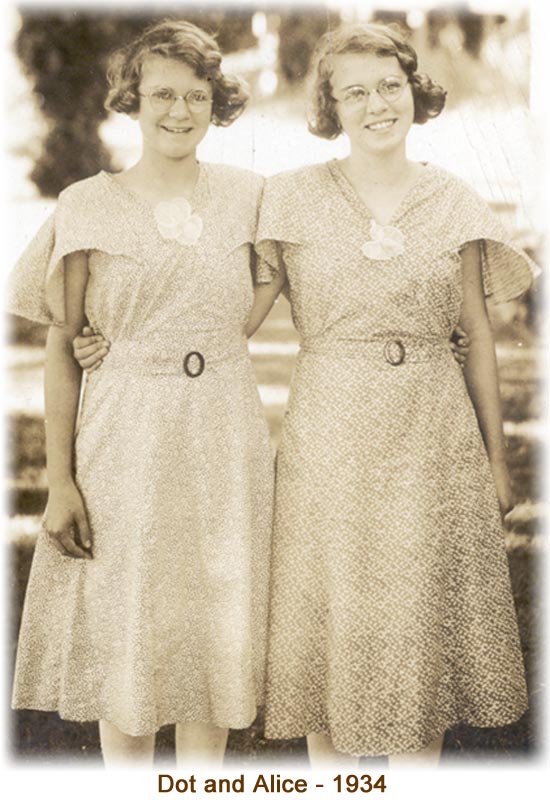
Of her Christian experience Dorothy says that she always knew that God loved her. She learned from the songs her mother taught them and the loving faith of her parents shared always in family prayers. Alice and Dot were each given a King James Bible in which their mother carefully marked the verse John 5:24 (Truly, truly, I say to you, whoever hears my word and believes him who sent me has eternal life. He does not come into judgment but has passed from death to life.) and then explained what it meant. In the tropical heat most foreigners found it necessary to rest awhile after lunch.
One day while Dot and Alice were reading in their Bibles as they lay on their beds during rest hour, they both decided they wanted to join the church. There were 50 Congolese who joined the church with Alice and Dot. Dr. Motte Martin, a fascinating pioneer missionary officiated at the service. The children loved him, nicknamed him “Pim” and would visit his apartment to make faces in his rounded mirror.
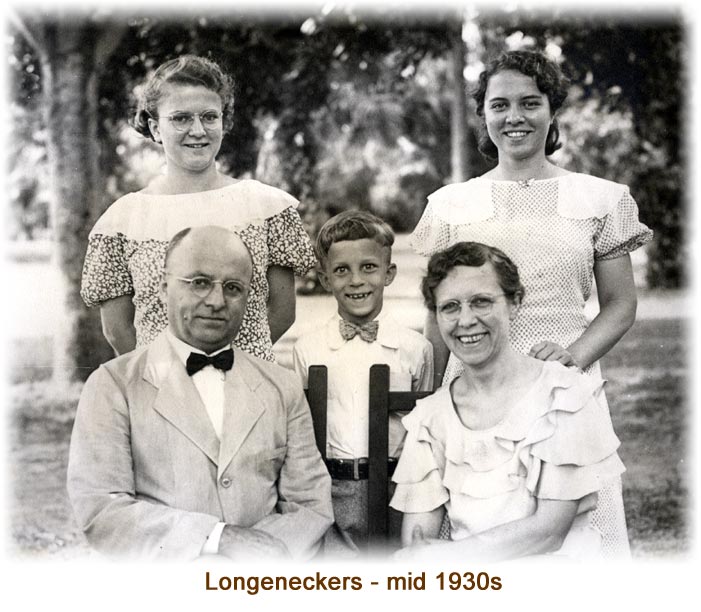
It was a joy to hear Dot’s “random recalls” about the fun of making Christmas presents ahead of time, worshiping with friends and the special Christmas programs led by the missionaries. Sleeping under mosquito nets was routine; fighting white ants and termites was also, and the legs of their dining table sat in little cans of water topped with kerosene to discourage the accent of tiny ants to devour their food first. There were no “flush toilets” in her youth and helpers had to carry their water used up from a spring. But Dot’s thoughts about her home are attached with a feeling of safety, cleanness and coolness. Dot said, “Mother always had fresh flowers the house and potted plants and ferns on the veranda. Our home was attractive and happy.” They played dominoes, anagrams, horseshoes. They sang, told jokes, and shared stories. They sewed and read aloud. There was tenderness and supportiveness among them.
Their first three furloughs, as Home Assignment was called then, fell when she was 1 ½, 5 ½, and 10 ½ and were spent on the farm in Missouri. Her next year in the United States was at age sixteen when they stayed at Mission Court in Richmond where she attended Thomas Jefferson High School. She describes this as being the most difficult year in her life for she arrived from Africa not even knowing how to use a phone or ride a bus, and she felt painfully shy. To quote Dot, “Blessings on Mission Court and the love of Ginter Park Church.” There were 7 missionary high schoolers from 5 countries at Mission Court at that time with Gay Currie of China the ringleader of most of the fun events. The next year Dot entered Queens College in Charlotte at age 17 where she found things easier. With parents in Africa she spent her summers in Montreat at Collegiate Home, a summer home for missionary young people established by Montreat ladies led by Miss Lidell. It was the envy of other Montreat young people who sensed a special closeness and kindred bond among these young people whose parents were serving Christ’s kingdom abroad. At Collegiate Home Dot first met Joe Hopper who was just one of her good friends. Dot and Joe were blessed by attending Synod of North Carolina Young People’s Conferences in the summers which were held on Davidson College campus. Her College years were punctuated with the feeling of confidence given her when she became President of the Queens Christian Association her final year and the morale boost of having her short story win the creative talent contest. She taught Bible School in Ash County one summer and was bitten by bed bugs. She earned her B. A. Degree in English and proceeded to the Presbyterian School for Christian Education in Richmond, then known as A.T.S, the Assembly’s Training School.
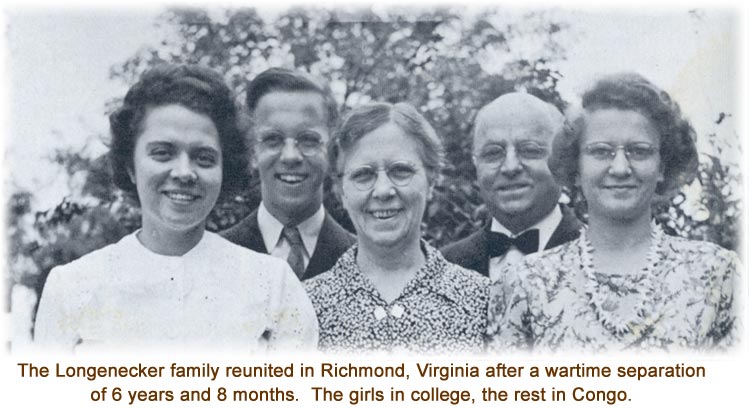
In 1941 she was eagerly awaiting the arrival of her parents when a cablegram brought word that they could not come due to submarine activity in the Caribbean and of course, the only transportation available was by ship which meant waiting for 2 ½ more years to see them. This was a big blow to her. Dot had planned to live at Mission Court with them, but Dr. and Mrs. Henry Mack on the A.T.S. faculty invited her to live in their Home. Upon graduation she went to Blackstone, Virginia, to work with the Reverend Thomas and Louise Fry. She was paid by the Defense Council to work with serviceman and their families seeking to bring them nearer to Christ and within the Christian fellowship of the Blackstone Church.
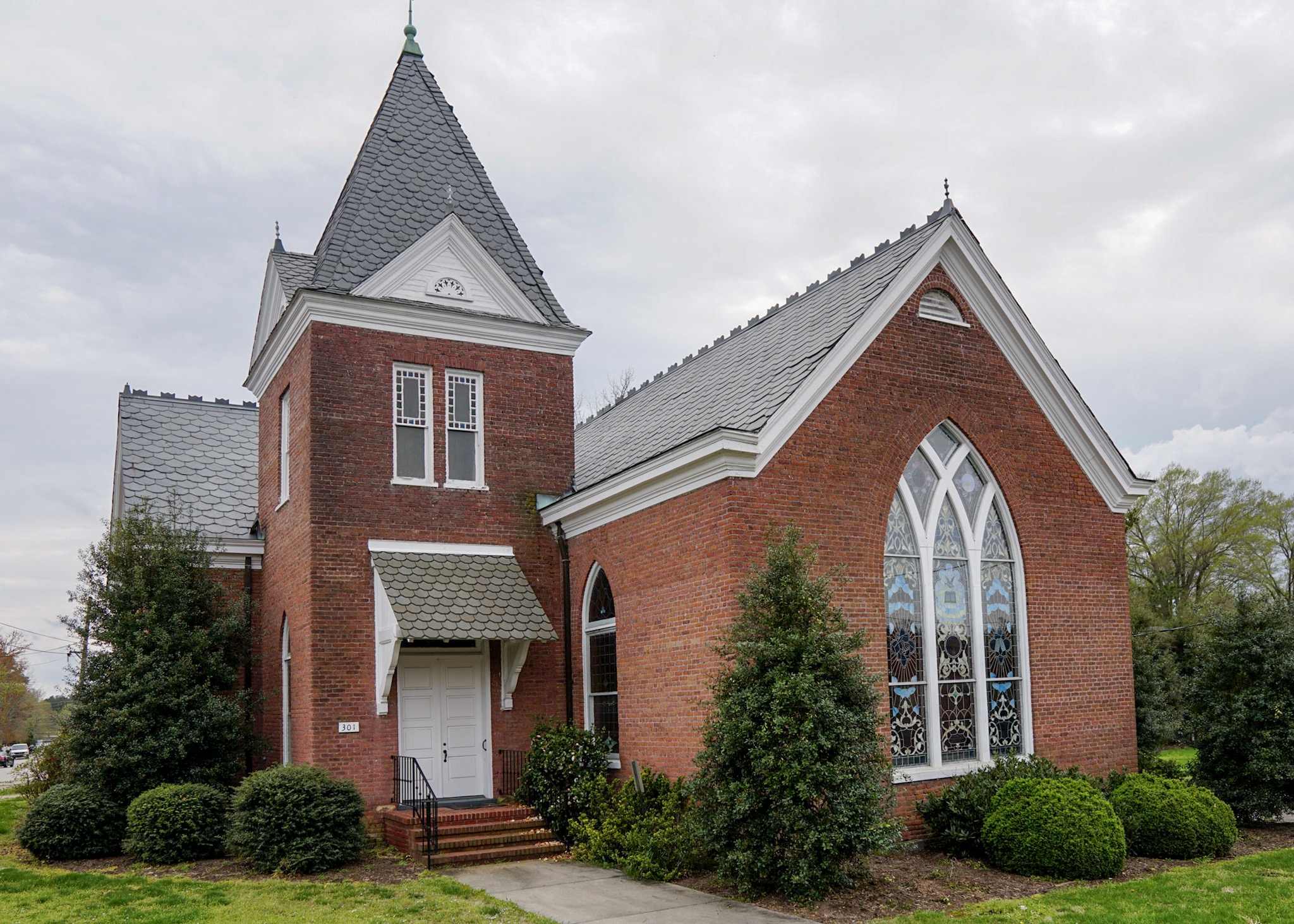
In March 1945 after a loving farewell from the church, she went to join her family at Mission Court. She applied for her African visa and began buying clothes appropriate for missionary service in Africa. The generous farewell gift of money from Blackstone Church was spent on luggage on which she had her single initials put. But her “good friend”, Joe Hopper, took her to hear Kagawa preach at the Mosque, and they began serious dating. They had been friends in Montreat, and both had attended some Queens/Davidson parties; also, he was at Union Theological Seminary one year while she completed A.T.S. across the street. He had visited her in Blackstone when he spoke on Korea at the church there. More and more she had the feeling that “it was not so bright an idea to go to Congo”, single that is; but when Joe finally proposed she hated to break a commitment made and said she would be had in three years.
She talked over her plight with her parents, feeling more and more like hypocrite when people would introduce her as “one of our own returning to Africa.” Her father’s loving counsel was that the Lord instituted marriage before missions; so, Joe wrote the Board of World Missions to break her appointment by them and the State Department sent back her $10 for her visa. She Joe visited Blackstone where Dr. Fry announced their engagement from that pulpit. Most people do not realize that missionary children have no home church in which to get married, but the Blackstone Church became her home for this important event in her life. The Women of the Church decorated the sanctuary and put on their reception. Despite gas rationing all of their immediate family members were present for the rehearsal and wedding, except for Mardia Brown who had two young children. Joe had $50 for their 3-day honeymoon in the Natural Bridge and Mountain Lake area of Virginia. Young people of the First Church of Petersburg gave them a noisy send off with all the trimmings for newlyweds for Joe had worked at two chapels out from First Church as well.
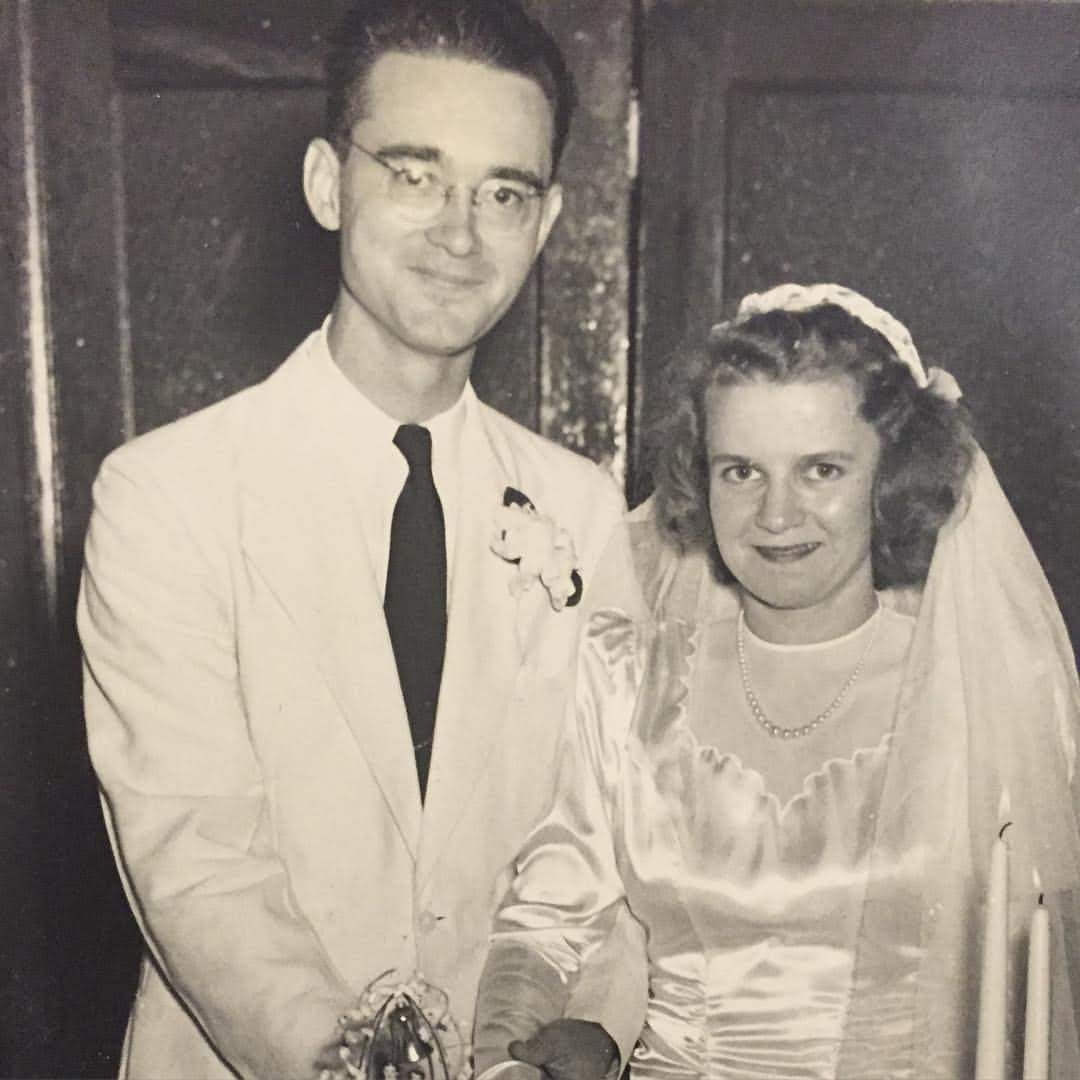
Joe took his bride to Callaway, Virginia, where he was pastor for five churches and outposts at the foot of the Blue Ridge Mountains about 40 miles from Roanoke. They were provided with a huge manse and even bigger garden which got terribly neglected their first summer as they put on five vacation Bible Schools. The parishioners decided that if “Preacher Hopper” attended to the spiritual lives of their children, they could provide their minister with vegetables. Thus, ended the Hopper’s’ farming career until they reached Korea. The Hoppers rejoice that Piedmont Presbyterian is now one of their fourteen supporting churches; without the prayers and sacrificial systematic giving of theses churches, Joe and Dot could not have served in Korea obeying Christ’s Great Commission. Dot described the people near Callaway as “Salt of the earth folks!” Their first child, Alice was born in Roanoke while there. The summer of 1946 Dot and Joe were commissioned at the Montreat Missions conference as missionaries to Korea. They wished to come night to Korea in 1947 but due to the unrest of that time, families with children were not permitted to go; so, in the fall they were sent to Yale Institute of Far Eastern Languages. They made many long-lasting friendship during their struggles there. Returning to Mission Court in the summer of 1948, they awaited permission to go to Korea to on troops ship: the only transportations available those days. When Dot was about six months pregnant, they sailed to Inchon. Joe’s parents were on the dock to greet them as was a black Army band playing for the military, it made this African–born young lady feel right at home. This was a time of great confusion in Korea when Communist elements revolted, taking over a large area in the 1948 insurrection called the Soonchun uprising. Joe’s parents came to be with Dot prior to the birth of Barron, their second baby, delivered by Dr. Paul Crane two days before Christmas. Curly-haired Alice was the first child to return to the Mission after World War II.
Joe’s first request from Koreans was that he be the choir director at a church across town which he was glad to do. Lepers living in pitiful conditions in a riverbed sought his friendship and help. His loving care of them and their church during their years of ministry, earned Joe the privilege of being Pastor Emeritus of their church in Samnye where these folks have a thriving chicken business. These leprosy patients do well, are integrated back into society and welcome Joe each Christmas morn to preach at their church. Upon arrival in Chonju, Joe had of necessity rounded up some carpenters and workmen to repair the shell of the house they were to live in for 17 years. When Dot first saw it, there were no doors, no windows, no electric fixtures, no plumbing an old huge tub too heavy to move. Margaret Pritchard, the nurse, graciously cared for them till their abode was usable. Dot fixed this house into a home and was mostly busy with children and family although she renewed Korean language study the day Barron was a month old. To get milk for the children, Joe traveled to Mokpo where he sought the man who had worked for his parents when he was a lad. There he bought a Holstein from him, rented a box car which they filled with soybean feed for the cow and proceeded to Chonju all for a cost of $115. Pea-sae-won, who knew how to care for a cow, and his patient wife, who did well at caring for “mish-kids”, became Dot and Joe’s faithful helpers for years and years. Deacon Pae gardened using American seeds, milked and pasteurized the milk, and acted guard the many nights Joe was off itinerating. Nurse Pritchard knew when women lacked milk to nurse their babies and instructed them to go to the Hopper’s kitchen door daily to get the milk they needed. Other missionary families bought milk for their children, also.
Dorothy attended West Gate Church where she took off her shoes at the door and entered to sit with the women while the men sat on the other side. Many mothers in the congregation wore Chima blouse and Chogori skirts back then and sat nursing their babies. To this day Dorothy has a deep concern for Korean women and for their children, especially the little ones. She has watched and rejoiced as many friends have grown in grace and in the knowledge of Christ, maturing into excellent leaders in local churches or Presbyterial work. In the tradition of her mother in Africa, at time she has given parties for 40 or 50 Korean women of the Church ladies in her home. What laughter and fun they have shared in the Hopper living/dining room!
The sudden invasion and outbreak of war in 1950 threw her family life into a different chapter. Dot became one of those who had to “evacuate” with only husband, children, and a suitcase a piece of things. The story of Joseph taking Mary and the infant Jesus to Egypt meant a lot to at this time, for although it seemed terrible just to drive away leaving Koreans to do the best they could, Dot remembered that in God’s time Jesus did return to carry out His Father’s will for Him. Dot said that on June 25, 1950, after the English worship service, Dr. Paul Crane told the mission, gathered at Chonju for their annual meeting, that an American advisor to Korean troops told him of the North Korean invasion that Sunday morning. Rev. R. K. Robinson had just preached on the Acts text, “They that have turned the world upside down have come here also.” Following the service held in the new Nursing School building, the men remained to assign responsibilities. Joe, her husband, was in charge of preparation of vehicles should they need to evacuate. Communications were meager then and few realized a war had started. Apprehensive of local uprisings, the missionary men, two by two, took turns patrolling the compound carrying hunting gun. Apparently, all was calm until Monday about midnight when a phone call placed to the American Embassy Dr. Linton went through and they were advised to proceed by convoy to Pusan.
Dot shared personally of the experiences that followed. “Sophie Crane and I (the most “expectant”) rated seats with doctor and nurse in the foremost vehicle. We spent the night in Soonchun. Some 70 passengers rode a freighter meant for 12 passengers to Japan and were greeted by Red Cross workers offering toothbrushes and other supplies. A wild bus ride during a blackout us to a military camp where for 5 days we were marooned, our men in one barracks, the women and children in another. And sadly, we knew that American boys were leaving the camp to fight in Korea. (Loving Korea we were grateful for the resolutions of President Truman and the United Nations.) Released to our Japan missionaries, we were hospitably received, but 22 persons in one house in hot weather is difficult. l chased our children by day; wept by night and thanked God when the mission requested that the Hoppers be permitted to fly to Seattle. It was my first flight and expensive for the Board of Missions, but we thanked God to get going. Joe did not wish to leave but a wise 80-years-old-plus physician who had evacuated from China eight times and lost all of his possessions six times, realized my needs and persuaded Joe to do so”.
Two months after the evacuation from Korea and Japan, during the time McArthur was landing troops at Inchon, David Hershey Hopper was born in Richmond. Mission court again sheltered us while we shared an apartment with my parents who were back from Africa and delighted to be with their grandchildren. Joe utilized this time to get his Th.M. with a fellowship given by Union Seminary at graduation and this enabled the Hoppers to move into a graduate student apartment. It was just after three cases of chickenpox and three of scarlet fever that Joe and Dot received THE letter from Mrs. W. A. Linton which made them pray earnestly before coming to a very difficult decision. She wrote that a young missionary (Joe) was needed to working Chonju so that Dr. Linton who required expert medical attention could receive it in the states. It seems Dr. Linton would not leave Chonju unless replaced and Mrs. Linton wrote that Joe seemed the logical one to go.
To put it in Dot’s own words,
In principal we disapprove of “split families” but decided that if the American G.I.’s were fighting in Korea and separated from their families for freedom’s sake Joe should go as the Lord’s work was calling him there.” Thus, the day after Joe received his degree, they headed for Quitman, Georgia, where Dorothy’s daddy had accepted the pastorate of first church. Her daddy had developed diabetes which would always require insulin and thus they were discouraged from returning to Africa. An apartment for Dot and the children was prepared with borrowed or furniture purchased “dirt cheap” and Joe prepared to depart. But they waited thought that long, hot summer for United Nations clearance to return to Korea and by September decided perhaps the Lord did not want him to go. However, the week of their David’s first birthday, the united Nations Permissions came and regretfully the kids and Dots kissed him “goodbye”.
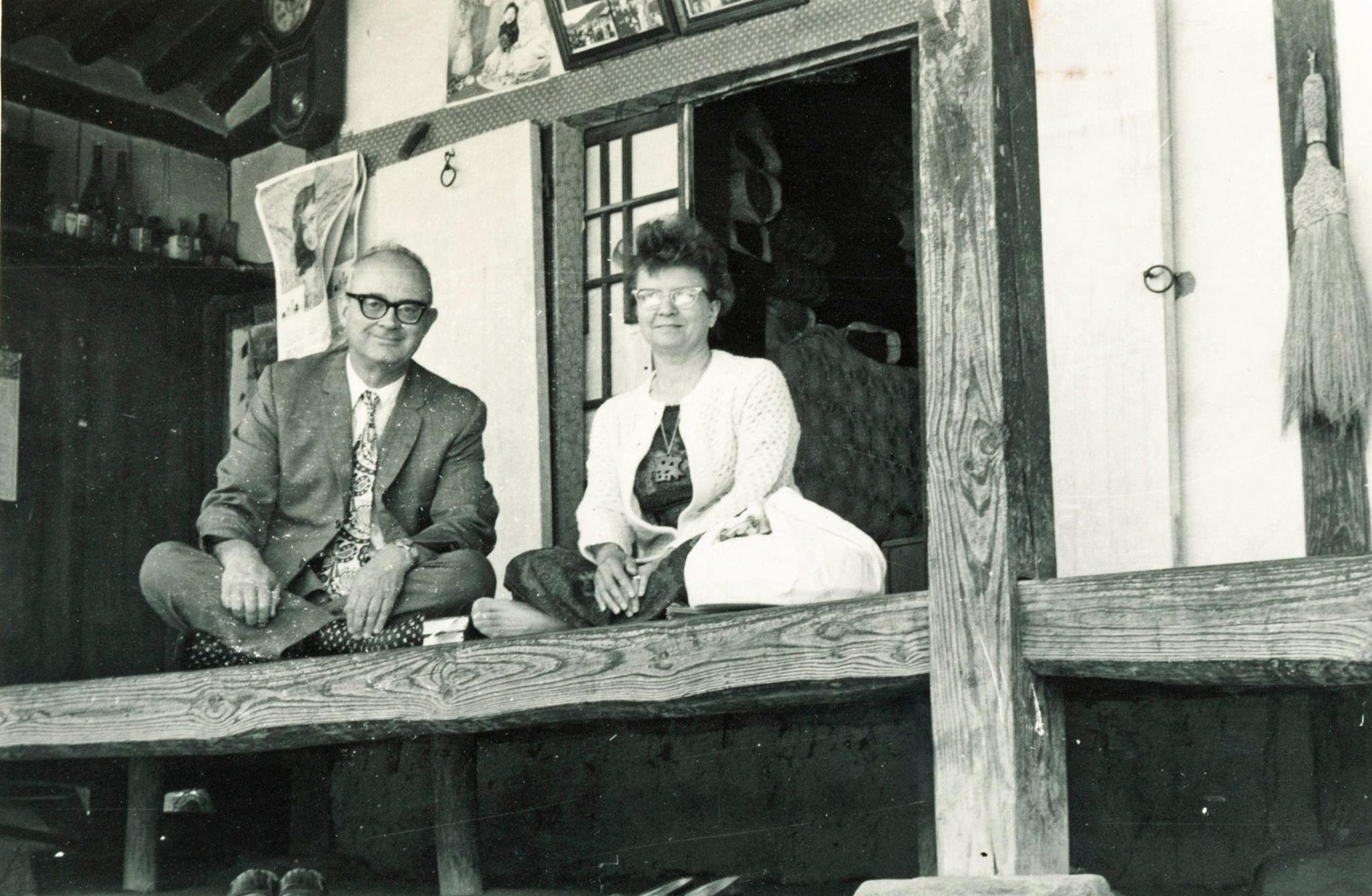
Dot says that the love of friends in the Quitman Church and the presence and help of her parents upheld her somewhat, but most of all the everlasting arms of the Lord gave her stamina to get along without Joe. In Dot’s words,
I fell into bed evenings when the children did rather than blithely sewing on the new machine Joe had given me. One summer Joe’s mother invited the children and me to be near her in Montreat. A Bible Hour taught by Dr. John Anderson, then of First Church, Dallas, on Abraham’s willingness to offer his precious Isaac to the Lord lingers to bless me, for I was feeling sorry for myself and needed its encouragement: “First the test; then then the blessing.”’" Our separation proved so to Joe’s and my marriage. Joe, back at work in Chonju, was not near the fighting except for guerrilla activity. One Sunday driving to preach in a village, his vehicle rounded a bend of the road to find the church and homes in smoking ruins with shooting still in the hills nearby. Much refugee work was necessary. He wrote me that some people had only grass to eat. Later when I was able to go back to Chonju, an again Methodist minister brought me an engraved round brass tray and told me in English, “Your husband was like an angel to us!”"
The 19 months did pass and by God’s grace, Joe came back to us safely. The first day after his return just after we put 4 1/2-year Barron and 2 ½ years David down for naps, we happened to hear Barron instructing David: “Mama is the boss of we, but Daddy is the boss of she!” Joe took us to Montreat where we learned that American parents with children were still not permitted into Korea; so we readied ourselves and joined missionaries in Japan where a Korean language school had been set up, and the men could go work in Korea. We lived in the down start of a Japanese house which shook with the earthquakes. I taught Alice first grade and studied Korean some with a tutor who came to our home. The children loved the black pot bathtub which reminded me of a cannibal pot but they called it the “oh, phooey!” rather than “ofura”. The American military was most gracious in allowing us to ride their bus sent to gather dependents for Sunday worship in English held near the Diet Building. A Methodist Chaplain Anderson fed us richly from the word of God.
Daddies were off to Korea. Then, praise the Lord! – around Easter of 1954 families were told they could re-enter Korea. Husband came to get us and following hasty packing we returned Home to Chonju. We settled into years of “living happily ever after” as a family. Perhaps fifty Korean playmates of the boys, pet crows, pet magpies, rabbits, chickens, dogs, trips to the hospital to get stitches enlivened life. Joe’s care of the churches took his time, assisted by Mr. Lee, Young-Choon, then young. (Now fragile elder Lee, a widower, lives in Bangladesh with his missionary-internist son, lovely daughter-in-law and two grandchildren.) Many was the night deacon Lee and Joe shared a warm floor in a Korean Christian’s home in the boondocks of North Chulla Province. Many were the baptisms to be administered, communions to be served, and problems to be tackled in the tiny, weak parts of the Body of Christ which these two men with the Holy Spirit assisting, sought to solve. They planted Seeds of the Word of God and helped others plant churches in this area. What a deep satisfaction it has been to us to be here long enough to watch the Korean church grow and bear fruit for the kingdom. What a thrill it was to attend her centennial celebrations!
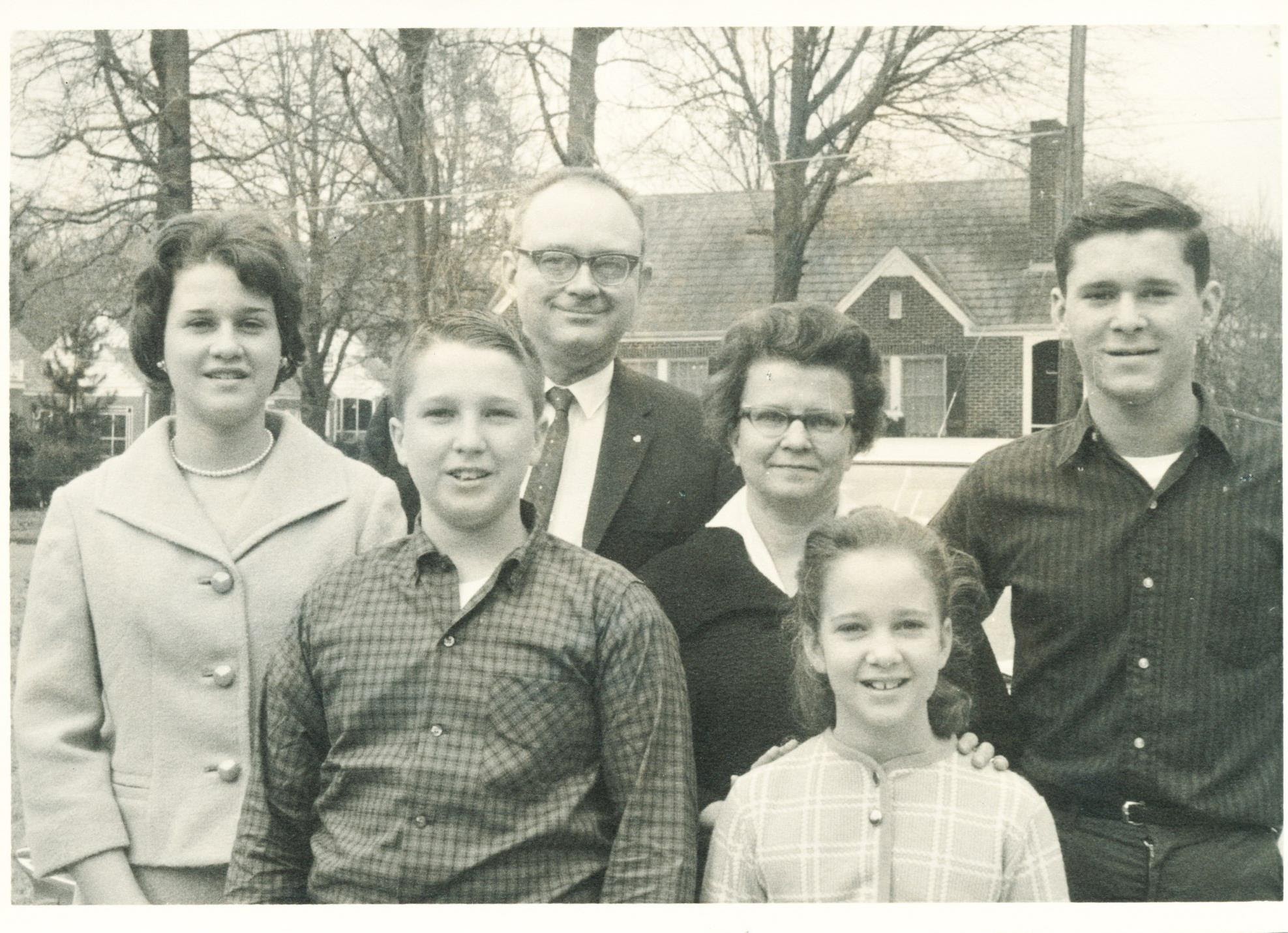
But there came the years of major splits in the church. Dot said that she was not actually involved but what wife is not terribly emotionally torn when her husband is right in the thick of such and not by choice. Dot is convinced that these fights are stirred up “by the devil, the father of lies, who goes about the earth seeking whom he can devour spiritually. It was the weak Christians and the new Christians who, failing to see the Spirit of Christ at work or find any salvation for their personal sins in some of the behavior by the church leaders fell away from the church. I think they felt, if all folks do in the Christian churches is fight, I want none of it; I’ll go elsewhere.’ Once Joe will ill with a bad carbuncle which confined him to bed. Dot had to escort Korean elders and deacons and ministers, either individually or in groups, up to his bedroom so that they could pour out their woes of how the church splitting were involving them and their congregations. In Presbyterial meetings she reported that at the time for reports there were tears and tales of heartache. As Dorothy thought of these disagreements among brethren, she remembered the words from James, ‘My Brethren, these things ought not so to be. Doth a fountain send forth at the same place sweet water and bitter?’ She said that the words of Paul in Philippians 4:4 beseeching two ladies to be of the same mind in the Lord is still a very pertinent plea to Christians! Quoting Dot,
Careful knowledge of what one does believe from the Word of God and why and standing up for one’s faith and convictions are needful. But petty hatreds, selfish words and wicked actions do not honor the Lord of Glory who died for our sins and rose gloriously that He might now live through His children.
The year that missionary families returned to Korea, each couple in the Mission had a new baby born. To the Hoppers it was Margaret Lois who was born on Sunday afternoon, two days after her 8-year-old sister’s birthday; delivered by Dr. Paul Crane. Dorothy states,
When I married my husband, included with him were the Chidi Mountains which he had loved with a passion since a boy. Vacations on Mission fields are important that one may rest as our Lord took His disciples apart to do. A simple clapboard cabin up Chidi with a loft for our children to sleep in has been as a magnet drawing our family closer to each other and to the Lord Who created the beauty of the streams, the mountain ranges, the trees clapping their hands and each of us. I think the Lord has used Chidi and our children’s memories of fun and worship there as a steadying influence when, far from us, at times their Christian actions required them to swim upstream counter to American culture. Joe’s father stated, “Chidi is not for the fainthearted”; nor is it, with no car road up. Its hymn, “I sing the mighty power of God who made the mountains rise” (by Isaac Watts) is as appropriate when we sing it nowadays as it was in the similar but larger camp of Joe’s boyhood.
Our Alice and David graduated from King College, Bristol, Tennessee; Barron from the University of North Carolina in Asheville, Margaret from Emory University School of Nursing receiving R. N. and B.S. degrees. The first three graduations we were unable to attend, as my parents (in Africa) had not been at my college graduation. But we rejoiced to watch Margaret receive her nursing pin one evening and college diploma the next morning. And the Lord has blessed us by enabling us to be at family weddings.
Each of our children have served the Lord in Korea for brief periods of time except for Margaret who worked in Haiti and later in Bangladesh. Within a 7 year span the Lord gave us 7 grandchildren, one a year with another now on the way. Joseph, Justin, Jacqueline, Betsy, Lydia, Rachel, Martha are each unique, priceless creations in the eyes of their grandparents. Surely grandchildren are the most marvelously heart-warming gifts that the Giver of every good and perfect gift can send to a family. Each of ours has taught and blessed us. Perhaps we’ve learned the most from Lydia, David and Liza’s precious Downs Syndrome daughter. We now realize that each person is handicapped in one way or another. Since her muscle-tone development delayed Lydia’s ability to talk, I had persons on 3 continents praying for her. Later a Korean fisherman’s wife, waiting tables at a Presbytery meeting on Cheju Island, stopped me after lunch to ask if Lydia could yet walk; and a Korean deacon with Parkinson’s sitting on his pallet in his village home haltingly asked how Lydia was getting on, for he was praying for her.
Dr. Ham Hamilton of China missionary fame calls his sons-and-daughters-in-law the “spice” of their family. Such are ours: Jack Dokter, an Electrical engineer in Stone Mountain, Georgia; Martha Mathes (Hopper), whose husband, Barron, will this year complete his ministerial course at Columbia Seminary; and Liza Watters (Hopper), doctor’s wife in Princeton, West Virginia.
Time and space do not permit me to seek to explain the depth of closeness we feel with other missionary colleagues and with Korean Christians of all ages. But having watched the Lord’s power and providence at work on three continents, I can echo the song of that prolific blind hymn-writer, Fanny Crosby,
All the way my Savior leads me, What have I to ask beside. Can I doubt His tender mercy, Who through life has been my Guide?
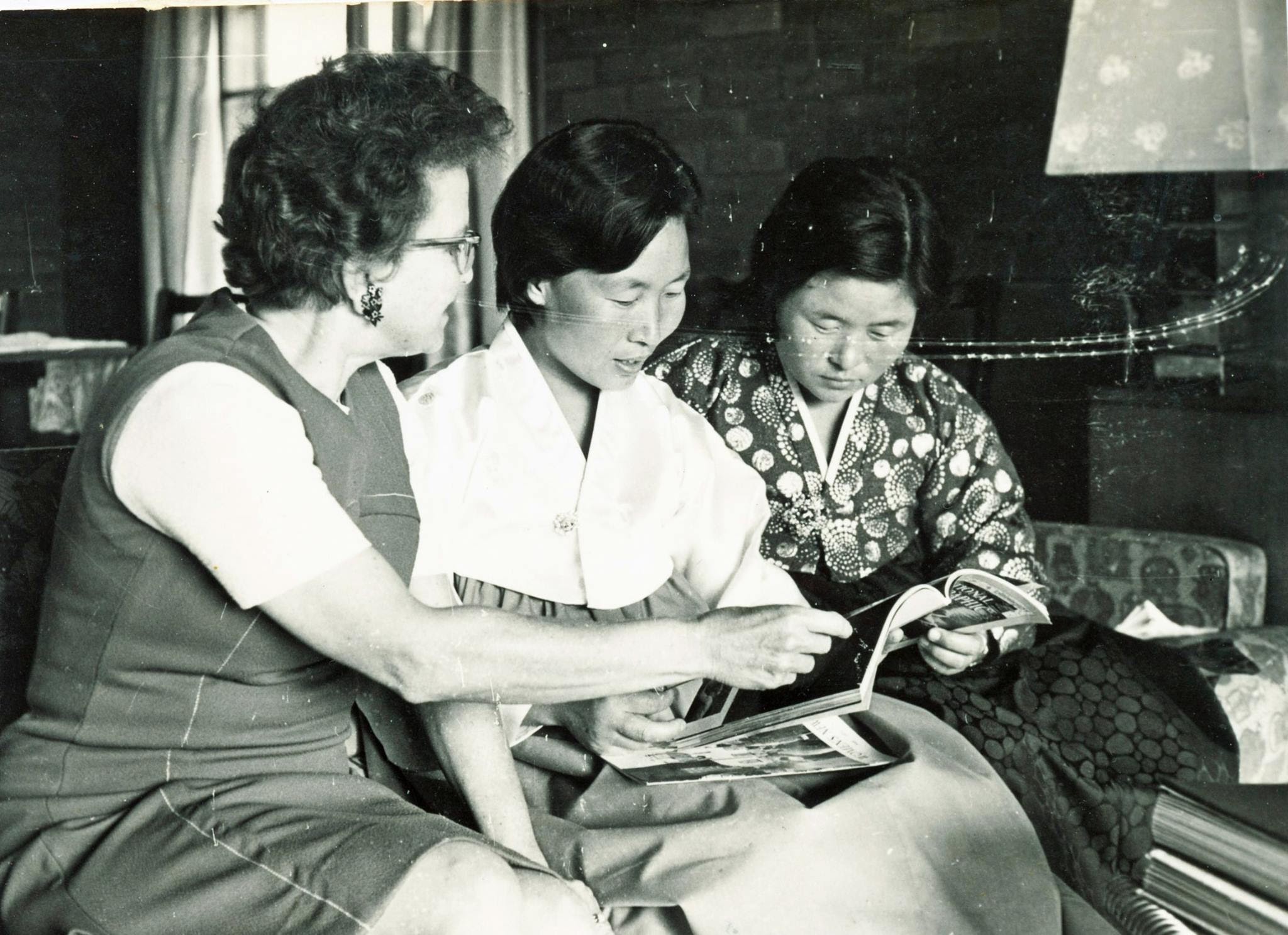
Your interviewer could tell about Dot: the willing helper, the generous and loving neighbor, the faithful encouraging friend, the prayer warrior and silent support of strength for her husband and family. She along with the other missionary mothers in Chonju had to teach the missionary children until all were through the sixth grade. Looking at the number of these children with graduate degrees from prominent schools, I would say those mothers did a dedicated job. During these years she used her creative skills for her family, but after she sent the younger daughter to boarding school, for about seven years Joe and Dot itinerated in a jeep pulling a little 13-foot travel trailer given by the men of Covenant Church in Charlotte which was their home on wheels. Later, she again took up her creative writing and has contributed to the English-speaking Korean community through her articles for the Korea Times newspaper. Dot is a disciplined person with her time and means. She would bring her clock and sit down and read to an ancient mother who could no longer see well enough to read, or go sit by a bedside and read for a patient’s diversion and healing, or join a fellow missionary for a time of “talking with the Lord”. I think of her as embodying the finest attributes of a Christian woman. With a Korean lady she has visited the women in prison leading Christian worship weekly. She has hugged and played with many a little orphan. I picture her in the country out under a tree next to a little Church surrounded by children and often grandparents telling the wonderful Bible stories using large pictures as illustrations. When necessary she would pump the little organ to accompany hymns. Always she has been Joe’s partner in ministry wherever the Lord has called them. Most recently this has been to the island of Cheju off the southern coast of Korea, a beautiful tourist site, but a land filled with superstition, fear of evil spirits and struggling rural churches began by war refugees. Though their retirement from the field will begin in July of 1986, the influence of their ministry will continue on three continents and wherever a community is blessed by their presence.
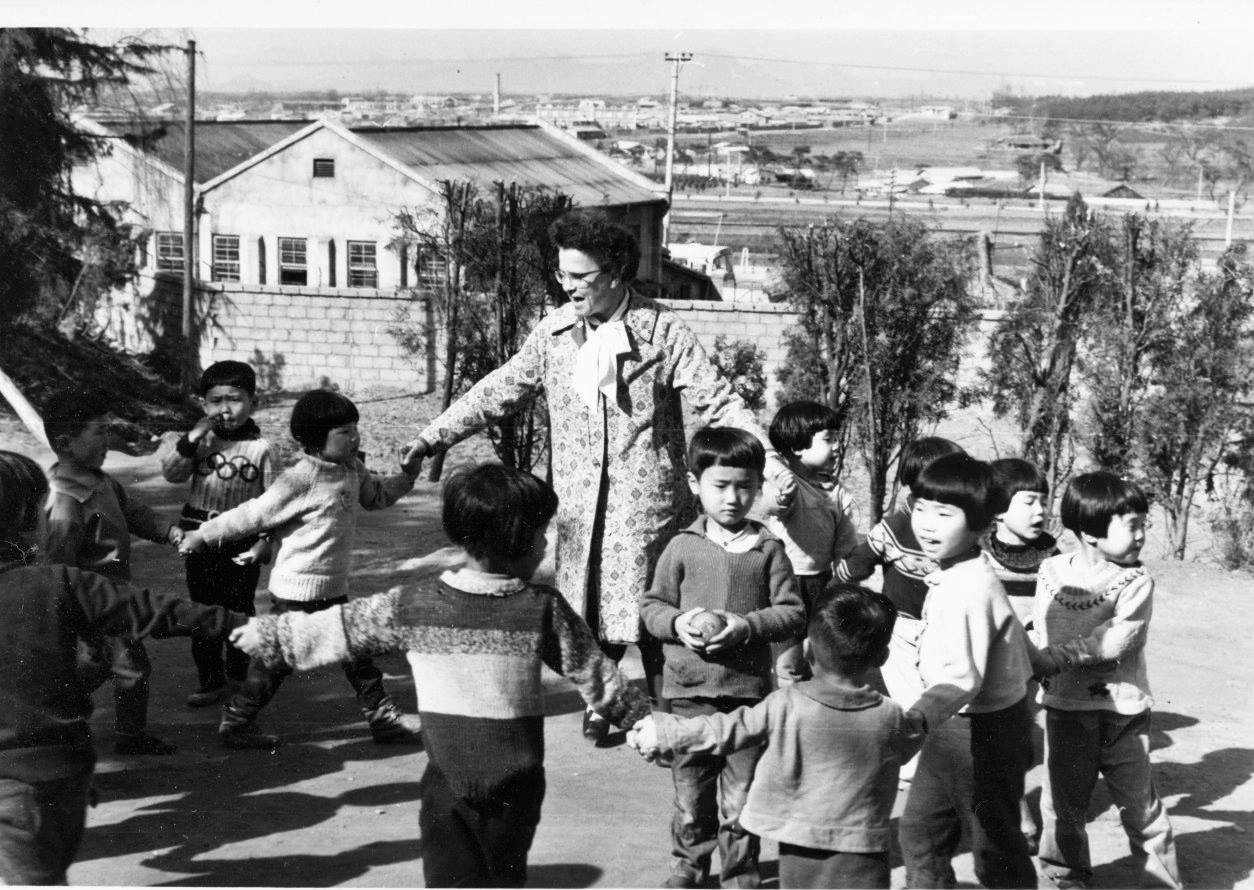
I think of Dorothy as a jewel faceted by the Lord to reflect His steadfast love. It can truly be said of her, “She is clothed with strength and dignity; she can laugh at the days to come. She speaks with wisdom, and faithful instruction is on her tongue. She watches over the affairs of her household and does not eat of the bread of idleness. Her children arise and call her blessed, her husband (and friends) also, and (they) praise her; many women do noble things, but you surpass them all” (Proverbs 30:25-29). I know for I am privileged to be her friend and neighbor.
ADDENDUM by David Hopper
The above was written by Mary Seel, career missionary to Chonju (Jeonju) with the Presbyterian Church, wife of Dr. David Seel.
After 1986 the Hoppers retired to Montreat, NC. Joe B. Hopper authored MISSION TO KOREA, which was published after his death, which tells more of the life of Dot Hopper. They lived in Montreat in their little home on Mississippi Road until Joe died in 1992. After a time living alone Dot moved to Highland Farms Retirement in Black Mountain, where she lived for a decade. Finally, she moved to Princeton WV where she lived at the Haven’s Nursing Home until her son’s family moved to NC. At that time, she moved to Brookshire Nursing Facility where she resided until she went to be with the Lord in 2015 at the age of 95. The nurses in Brookshire enjoyed her singing to them in Chaluba (a Congo tribal language) and Korean, and at times she would speak to people in a foreign language. Until her death she maintained the same sweet spirit. She is buried next to Joe Hopper at Mountain View Memorial Park.